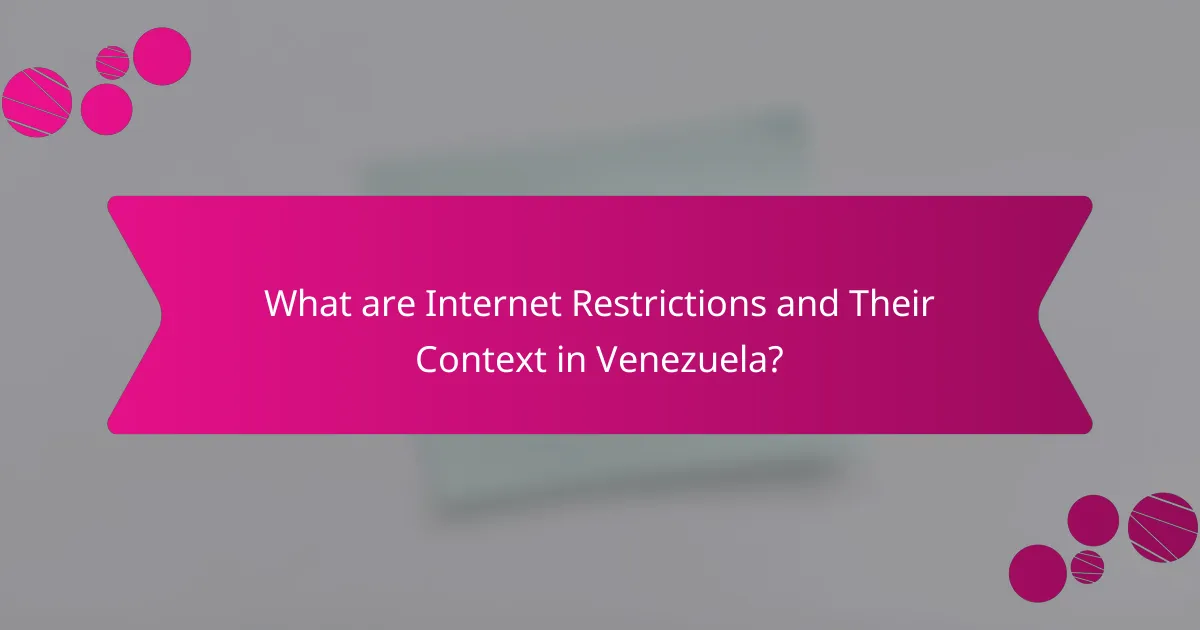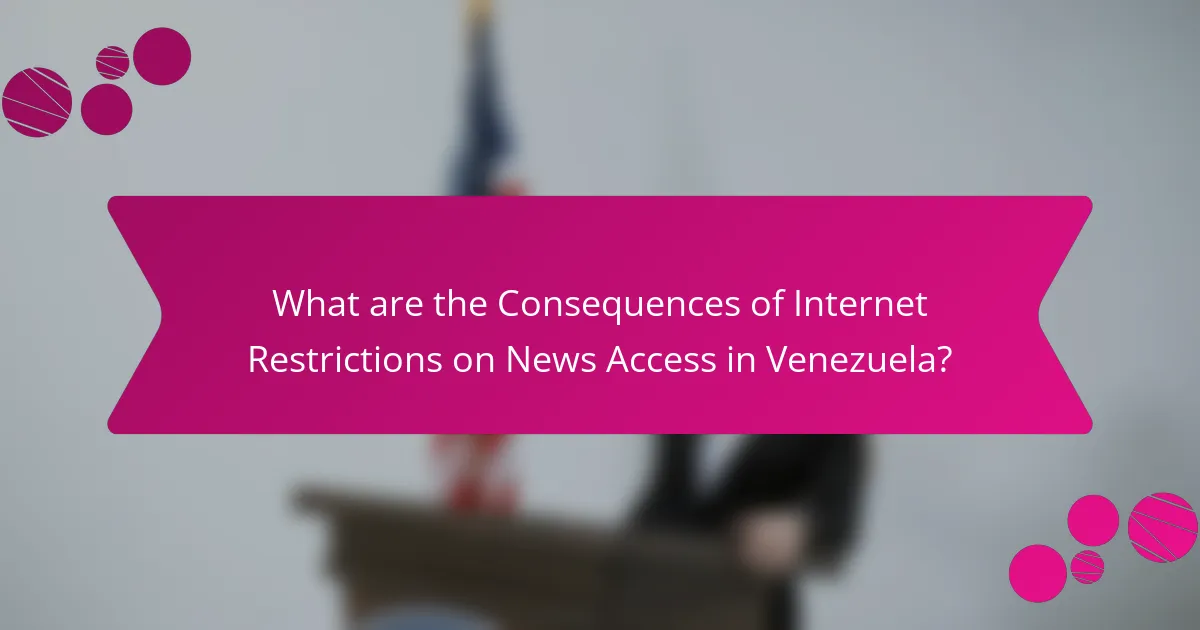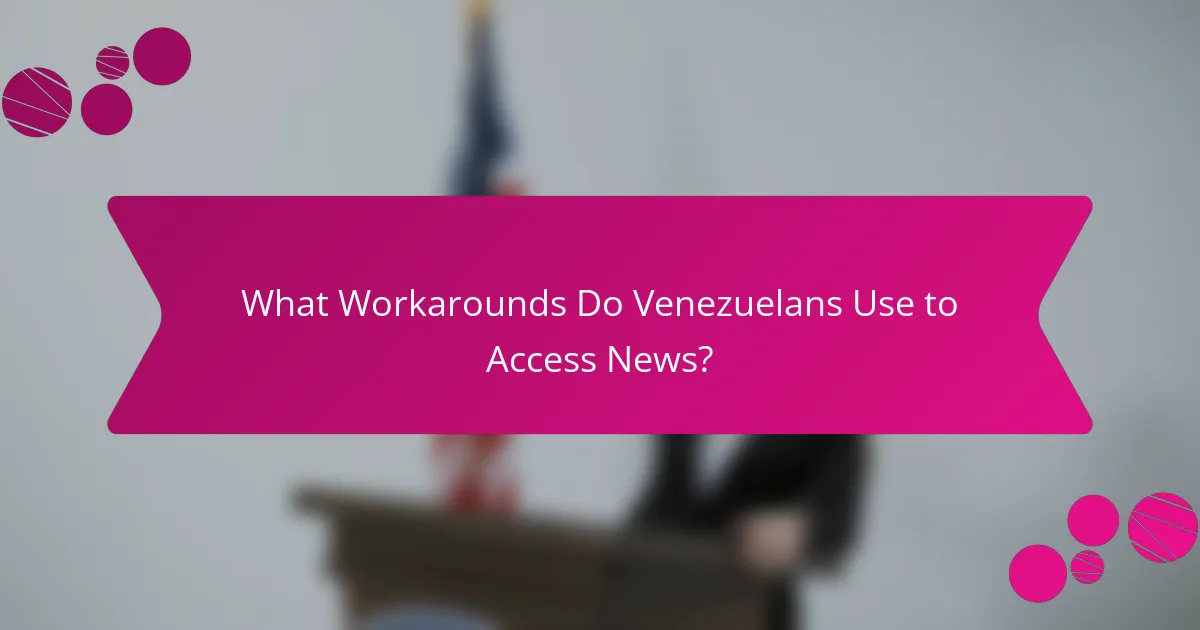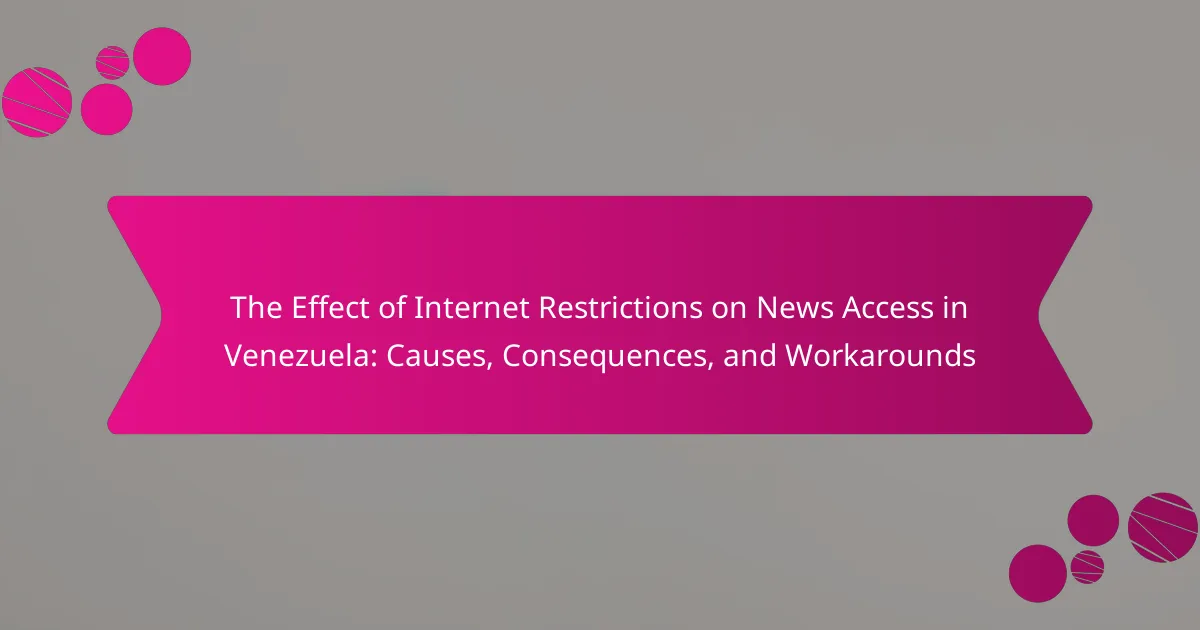
What are Internet Restrictions and Their Context in Venezuela?
Internet restrictions in Venezuela refer to the government’s control over online content and access. The Venezuelan government has implemented various measures to limit internet freedom. These include blocking websites, throttling internet speeds, and monitoring online activities. Such restrictions aim to suppress dissent and control the flow of information. According to reports from organizations like Human Rights Watch, these actions have intensified since 2014. The government often targets news outlets and social media platforms critical of its policies. This context highlights the challenges faced by citizens in accessing unbiased information.
How do Internet restrictions manifest in Venezuela?
Internet restrictions in Venezuela manifest through government-imposed censorship and limited access to online content. The Venezuelan government blocks numerous websites, particularly those that publish dissenting news or critical views. Social media platforms face intermittent disruptions, limiting citizens’ ability to communicate freely. Internet speeds are often throttled, making it difficult to access information quickly. Surveillance measures monitor online activities, creating a chilling effect on free expression. Additionally, the government controls Internet service providers, further enabling censorship. Reports indicate that these restrictions have intensified since 2017, coinciding with political unrest. Overall, these measures severely hinder the public’s access to diverse news sources and information.
What specific laws or regulations contribute to these restrictions?
The specific laws and regulations contributing to internet restrictions in Venezuela include the Law on Social Responsibility in Radio, Television and Electronic Media. This law allows the government to impose penalties for content deemed in violation of national security. The Telecommunications Law also grants the government authority to regulate internet access and content. Additionally, the government’s frequent use of censorship and blocking of websites is justified under these laws. These regulations create an environment where news access is significantly limited. Reports indicate that these laws have been used to restrict access to independent news outlets and social media platforms.
How does the government implement these restrictions?
The government implements these restrictions through various methods, including filtering and blocking websites. It uses technology to monitor online activities and restrict access to specific content. Internet service providers are often compelled to comply with these directives. The government also employs legal measures to penalize those who circumvent these restrictions. Surveillance technologies are deployed to track dissenting voices and control information flow. Reports indicate that these actions have significantly limited citizens’ access to independent news sources. According to a 2020 report by Human Rights Watch, such restrictions have increased since 2017. These measures aim to maintain control over public discourse and limit opposition.
Why are Internet restrictions imposed in Venezuela?
Internet restrictions are imposed in Venezuela primarily to control information flow and suppress dissent. The government seeks to limit access to independent news sources. This is part of a broader strategy to maintain political power. Internet censorship targets social media platforms and news websites. Reports indicate that these measures increase during political unrest or elections. The government claims these restrictions are necessary for national security. However, critics argue they violate freedom of expression. According to a 2021 report by Human Rights Watch, these actions severely impact citizens’ access to information.
What political motivations drive the imposition of these restrictions?
Political motivations for imposing internet restrictions in Venezuela include controlling information flow and suppressing dissent. The government aims to limit access to independent news sources. This strategy helps maintain political power by preventing the spread of opposition viewpoints. Historical context shows that similar tactics were employed during protests in 2014 and 2017. Research indicates that restrictions are often intensified during election periods to influence public perception. Additionally, these measures serve to protect the ruling party from criticism and accountability. By controlling digital spaces, the government seeks to shape the narrative and retain authority.
How do economic factors influence the enforcement of Internet restrictions?
Economic factors significantly influence the enforcement of Internet restrictions. Governments may impose restrictions to control information flow during economic crises. For instance, in Venezuela, the declining economy has led to increased censorship. This is often aimed at suppressing dissent and maintaining power. Economic instability can also limit access to technology needed for circumventing restrictions. Additionally, financial resources affect the government’s ability to monitor and enforce these restrictions. Data shows that countries with weaker economies tend to have stricter Internet controls. Thus, economic conditions directly correlate with the intensity of Internet censorship.

What are the Consequences of Internet Restrictions on News Access in Venezuela?
Internet restrictions in Venezuela severely limit news access. This leads to a lack of information on national and global events. Citizens rely on state-controlled media, which often disseminates propaganda. Independent journalism faces censorship and harassment, diminishing press freedom. Misinformation spreads as alternative news sources become harder to access. Public awareness of critical issues declines, affecting civic engagement. The consequences also include increased social polarization and distrust in institutions. Overall, these restrictions undermine democracy and human rights in Venezuela.
How do these restrictions affect access to news and information?
Internet restrictions in Venezuela significantly limit access to news and information. These restrictions often involve blocking websites and social media platforms that provide independent news. As a result, citizens struggle to obtain accurate and timely information. Research by the Committee to Protect Journalists indicates that over 80% of news websites are inaccessible. This leads to a reliance on government-controlled media, which often disseminates propaganda. Consequently, misinformation proliferates in the absence of diverse news sources. The restrictions create an environment where citizens are less informed about critical issues, affecting public discourse and engagement.
What types of news are most affected by Internet restrictions?
Political news is most affected by Internet restrictions in Venezuela. The government often censors content that criticizes its actions. This includes news about protests, government corruption, and human rights violations. Economic news is also heavily restricted, particularly information on inflation and unemployment rates. Reports on food shortages and public health crises face similar limitations. Additionally, independent journalism struggles under these restrictions, limiting diverse viewpoints. Access to international news sources is frequently blocked, further curtailing information flow. These restrictions hinder citizens’ ability to stay informed about critical issues.
How does restricted access impact public awareness and opinion?
Restricted access significantly limits public awareness and shapes opinion negatively. When access to information is curtailed, individuals cannot obtain diverse viewpoints. This lack of exposure leads to a narrow understanding of societal issues. Consequently, misinformation may proliferate in the absence of credible news sources. Studies show that restricted access correlates with decreased civic engagement and political participation. For instance, a report by Freedom House indicates that countries with high internet restrictions often experience lower levels of public trust in media. Thus, restricted access diminishes informed public discourse and can skew public opinion.
What are the social implications of limited news access?
Limited news access leads to significant social implications. It restricts the public’s ability to make informed decisions. This can result in a lack of awareness about critical issues. Citizens may become misinformed due to reliance on unverified sources. Limited news access can also foster distrust in media institutions. Social cohesion may weaken as communities become polarized. Furthermore, it can hinder civic engagement and participation in democratic processes. In Venezuela, these implications have been observed as citizens struggle to access reliable information.
How do Internet restrictions influence social movements in Venezuela?
Internet restrictions significantly hinder social movements in Venezuela. These limitations obstruct communication and information sharing among activists. As a result, mobilization efforts become fragmented and less effective. The government employs tactics like blocking social media platforms and throttling internet speeds. This creates barriers to organizing protests and disseminating information. Studies indicate that restricted access leads to decreased participation in social movements. For instance, during the 2017 protests, internet blackouts severely impacted coordination among demonstrators. Thus, internet restrictions directly undermine the effectiveness of social movements in Venezuela.
What role does misinformation play in the context of restricted news access?
Misinformation plays a significant role in the context of restricted news access. In Venezuela, government-imposed internet restrictions limit access to accurate news sources. This creates an environment where false information can flourish. Without reliable news, citizens may rely on unverified social media content. A study by the International Federation of Journalists highlights that misinformation can lead to confusion and distrust among the public. Misinformation can also manipulate public opinion and hinder democratic processes. The lack of fact-checking mechanisms exacerbates the spread of false narratives. Overall, misinformation becomes a tool for those seeking to control the narrative in restricted news environments.

What Workarounds Do Venezuelans Use to Access News?
Venezuelans use various workarounds to access news despite internet restrictions. They often rely on VPNs to bypass government censorship. VPNs allow users to connect to servers outside of Venezuela. This helps them access blocked news websites. Many also use social media platforms for real-time updates. Messaging apps like Telegram are popular for sharing news among groups. Additionally, some Venezuelans turn to international news outlets via satellite television. These methods enable them to stay informed despite restrictions.
How do individuals circumvent Internet restrictions to access news?
Individuals circumvent Internet restrictions to access news through various methods. They often use Virtual Private Networks (VPNs) to mask their IP addresses. This allows them to connect to servers in other countries. Proxy servers are another common tool. These servers act as intermediaries, enabling access to blocked sites. Tor browsers also provide anonymity and access to restricted content. Additionally, individuals may rely on social media platforms to share news. They can use messaging apps to distribute information among themselves. These methods have been documented in reports on media access in restrictive environments. For instance, a study by the Committee to Protect Journalists highlights the use of technology to bypass censorship in Venezuela.
What tools and technologies are commonly used for this purpose?
Common tools and technologies used to circumvent internet restrictions in Venezuela include VPNs, Tor, and proxy servers. VPNs encrypt internet traffic and mask user locations, allowing access to blocked content. Tor provides anonymity by routing traffic through multiple servers. Proxy servers act as intermediaries, enabling users to bypass restrictions. These tools help users access independent news sources and social media platforms. Studies show that VPN usage has increased significantly during periods of heightened censorship in Venezuela.
How effective are these workarounds in providing reliable news access?
These workarounds are moderately effective in providing reliable news access. Users in Venezuela employ VPNs and proxy servers to bypass internet restrictions. These methods can successfully access blocked news websites. However, the reliability of the news accessed varies significantly. Some sources may provide biased or unverified information. Additionally, government surveillance can compromise user privacy. A study by the International Journal of Communication found that while workarounds enhance access, they do not guarantee the accuracy of information. Thus, while useful, these workarounds have limitations in ensuring reliable news access.
What community efforts exist to promote news access despite restrictions?
Community efforts to promote news access despite restrictions include the establishment of independent media outlets. These outlets operate outside government control, providing alternative news sources. Local organizations often collaborate to share information and resources. They utilize social media platforms to disseminate news widely. Community networks also create encrypted messaging groups to bypass censorship. Initiatives like “Venezuelan Journalism” train citizens in reporting and fact-checking. International partnerships support these efforts through funding and technology. These collective actions help maintain an informed public despite challenges.
How do local organizations support news dissemination in Venezuela?
Local organizations in Venezuela support news dissemination by creating alternative media platforms. They utilize social media to share news that may not be covered by traditional outlets. These organizations often collaborate with international NGOs to receive training and resources. They also engage in community journalism to report on local issues. Many local organizations focus on fact-checking to combat misinformation. They provide workshops and seminars to educate citizens about media literacy. Additionally, they distribute printed materials in areas with limited internet access. This grassroots approach helps ensure that diverse voices are heard despite government restrictions.
What role does international support play in overcoming these barriers?
International support plays a crucial role in overcoming barriers to news access in Venezuela. It provides resources and technical assistance to bypass internet restrictions. This support includes funding for circumvention tools like VPNs and secure messaging apps. International organizations also advocate for press freedom, raising awareness of the situation. For example, the Organization of American States has condemned internet censorship in Venezuela. Additionally, partnerships with tech companies can enhance digital security for journalists. Overall, international backing strengthens local efforts to access unbiased news.
What best practices can individuals follow to access news in restricted environments?
Individuals can follow several best practices to access news in restricted environments. First, using a Virtual Private Network (VPN) can help bypass censorship. VPNs encrypt internet traffic and mask the user’s IP address. This allows access to blocked websites and services. Second, individuals can utilize Tor, a privacy-focused browser. Tor anonymizes user activity and helps access restricted content. Third, accessing news through social media platforms can provide alternative news sources. Many news organizations share updates via Twitter and Facebook. Fourth, subscribing to newsletters from independent media can ensure regular updates. These newsletters often bypass local restrictions. Fifth, using proxy servers can also help in accessing blocked content. Proxies act as intermediaries between users and the internet. Lastly, individuals should stay informed about local laws regarding internet use. Understanding the legal landscape can help avoid potential repercussions.
The main entity of this article is the impact of internet restrictions on news access in Venezuela. The article examines how government-imposed limitations, such as website blocking, throttling internet speeds, and monitoring online activities, suppress free expression and limit access to independent news sources. It discusses the legal frameworks that facilitate these restrictions, the political and economic motivations behind them, and the social implications for public awareness and civic engagement. Additionally, the article highlights the workarounds employed by Venezuelans to access news, including the use of VPNs and community efforts to promote alternative media, ultimately emphasizing the consequences of misinformation and the importance of reliable news access in a restricted environment.
